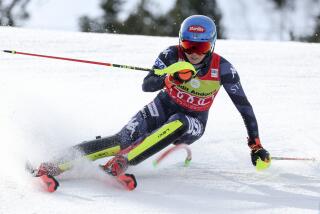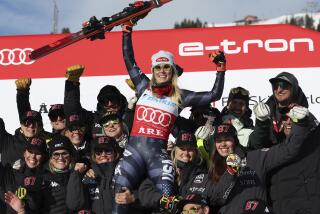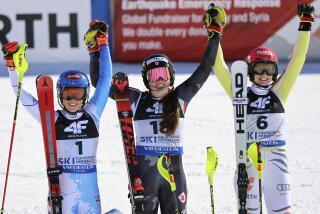American teenager Mikaela Shiffrin, 17, wins world slalom title
There is no doubt now whom the U.S. media will choose as the fresh-faced star in the run-up to the 2014 Winter Olympics.
It is Mikaela Shiffrin, 17, who became the youngest women’s Alpine skiing world champion since 1985 when she won Saturday’s slalom in Schladming, Austria.
Her sponsor, Italian food company Barilla, already has given Shiffrin some media training, since her age and prior success this season had made her a rosy-cheeked ingenue in demand.
That will become a full-court press by the time the Olympic ski season begins next October.
“So far, I’m trying to focus on racing,” she said in a conference call with U.S. media just before Saturday’s awards ceremony. “There isn’t too much craziness.
“People keep bringing up Sochi and the Olympics. For me, that is so, so far away. It is going to come really quick but I need to focus on now, because if I start to focus on tomorrow or Sochi, chances are I’ll get injured or something.”
Shiffrin, who turns 18 next month, already has redefined the paramaters of how quick things come.
She ran her first World Cup race at age 15, won her first World Cup medal at 16, won her first World Cup race at 17 in December, then added two more wins in January.
In her debut at the senior worlds, the high schooler from Vail, Colo., finished sixth in the giant slalom Thursday. Then she came from third after the first run of the slalom to beat 27-year-old Michaela Kirchgasser of Austria, a two-time Olympian, by .22 seconds.
When neither skier who had been faster in the first run, 27-year-old Frida Hansdotter of Sweden and 32-year-old Olympic silver medalist Tanja Poutiainen of Finland, could top her overall time, Shiffrin crouched in the finish area and leaned her head against her skis, as if stunned.
“It is very hard to process,” Shiffrin said.
Shiffrin, a senior at Burke Mountain Academy in Vermont, was among the favorites since she leads the World Cup season standings in slalom. She started the second run just .18 behind Hansdotter and .01 behind Poutiainen but skied with the aggressiveness of someone with nothing to lose.
“I have been really struggling trying to get speed up in first run,” she said. “When in doubt, I tend to be smart and sometimes that’s not the best idea because I end up being really slow.
“Today I was lucky that Frida and Tonja didn’t completely crush it in the first run. That gave me much more confidence going into the second run because I know that in the past and in training I’m always better as the day progresses, better at the finish than the start.”
Her gold was the fourth for the U.S. team – three by Ted Ligety – in the worlds with one event left, Sunday’s men’s slalom.
“It’s the Ted Championships,” Shiffrin said.
It is also the U.S. championships. Even without mainstay Lindsey Vonn, who tore up her knee in the first women’s event, Team USA has doubled its previous best gold total at worlds and is tied with Austria in the overall medal count for events on the Olympic program with five.
With the uncertainty over how well Vonn will have recovered by the start of the Sochi Games next February, Shiffrin clearly will have a bigger piece of the spotlight. By then, she may have added at least one speed event (actually, a half-and-half event), the Super combined, to her gated event playlist.
Shiffrin had to wait through nearly two weeks of racing at these worlds before they played her song - the slalom.
“I overcame some challenges,” she said. “I was a little bit nervous, a little bit fatigued. This (win) is helping me stay really positive going into next year. But even without a win here, I would have been positive, because it has been an amazing season.”
Then she went off for the playing of another hit song in Schladming.
The Star Spangled Banner.
More to Read
Go beyond the scoreboard
Get the latest on L.A.'s teams in the daily Sports Report newsletter.
You may occasionally receive promotional content from the Los Angeles Times.










